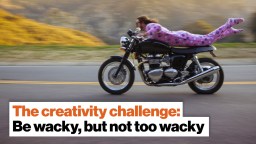music
We each have a way of moving to music that is so unique a computer can use it to identify us.
Your cat thinks your taste stinks. Also that you’re mingy with the laser pointer.
It doesn’t matter where you’re from — music is an emotional powerhouse.
Film critic A.O. Scott on how to be more constructive in your criticisms.
▸
4 min
—
with
Hierarchies of taste exist in our society, but their roots often reflect more than just the quality of work.
▸
3 min
—
with
The Zen of choreographer Merce Cunningham comes alive in a new documentary about his life.
Popularity is slippery, and shouldn’t be confused with quality, says critic A.O. Scott.
▸
4 min
—
with
A new study finds that societies use the same acoustic features for the same types of songs, suggesting universal cognitive mechanisms underpinning world music.
Dominant wild silverbacks wax musical with their mouths full.
“The hardest thing is the flying side of things.”
Before you judge someone’s personality based in their playlist, you may want to read the results of this study.
Is the way we hear music biological or cultural?
The history of the music industry parallels that of many industries and institutions in the U.S. Many, that is, except for education.
▸
6 min
—
with
Humpbacks swap songs at remote group of islands in the South Pacific.
In the village of Kongthong, villagers don’t call each other by their name; instead, they call out using unique, bespoke tunes that resemble birdsong.
Brain plasticity. Mindful superpowers. Pokémon invading our grey matter. Scientists have only begun to learn about the human brain.
Why Django Reinhardt might just be the greatest musical innovator you’ve never heard of.
▸
4 min
—
with
Singing is universal. It is found in all cultures and, despite protestations of tone deafness, the vast majority of people can sing.
Country music deserves better cultural ambassadors.
The ‘People Map of the United States’ zooms in on America’s obsession with celebrity
“In so far as bodily movements build the brain, every movement a human makes matters.”
It may be growing in popularity, but is there anything substantive to this new wellness trend?
From deejays to Debussy, it’s all brain food.
Research suggests that people with depression find sad music calming — or even uplifting.
Many of the world’s favorite records weren’t really recorded by the artist on the label.
How prone you are to boredom plays an unexpected role.
A new book on the music distribution service claims it is.
Musican. Actor. Fashion Icon. Internet Visionary?
▸
with
Want to make safer investments? Pay attention to the music playing in the background.





























